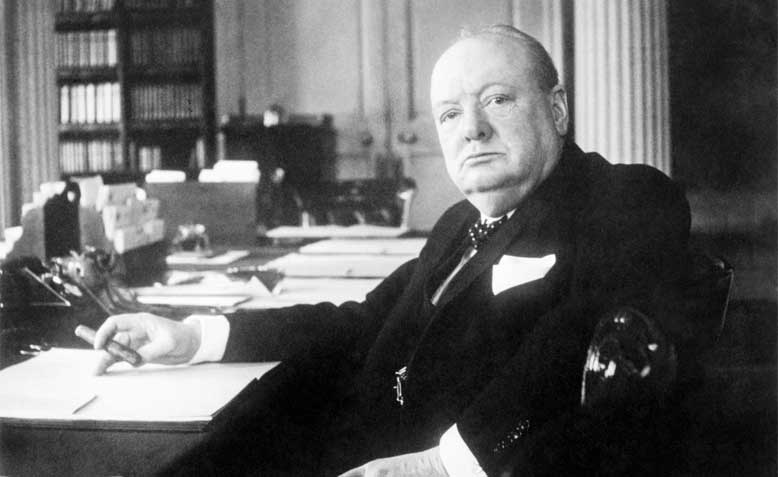 Winston Churchill at his seat in the Cabinet Room at No 10 Downing Street. Photo: Wikimedia Commons
Winston Churchill at his seat in the Cabinet Room at No 10 Downing Street. Photo: Wikimedia Commons
We repost Dominic Alexander’s 2019 article documenting Churchill’s record which tells a very different story to the heroic legacy of popular myth
Who was Winston Churchill? He was an aristocrat whose overwhelming commitment was to the maintenance of empire. He was a bitter opponent of the workers’ movement in Britain, whether in Tonypandy and Llanelli in 1910 and 1911, where troops were used against strikers, or in the General Strike of 1926. Although he accepted the construction of a welfare state after World War Two, this was under duress: promises of a profoundly transformed post-war social settlement were central to the popular morale and the whole war effort.
Domination
Many saw Churchill as a warmonger in the 1930s, and with good reason. He was part of the war party in the Liberal government in 1914, and raced ahead of cabinet decisions to put the navy on a provocative war footing. In this, he did his best to ensure that Britain would enter the war, well before the German invasion of Belgium was an issue. He was consistent in seeing Germany as the key enemy of the British Empire, so his opposition to Hitler in the 1930s was not out of any particular opposition to Nazi brutality, racism and dictatorship, but in an understanding that German domination of Europe threatened British imperial survival. Many British people were willing to fight Germany under Churchill’s leadership because much of the rest of the ruling class would have much preferred to make a deal with Hitler, which would have posed a grave threat to a host of British people; left-wingers, Jews and many others.
Contemptuous
Even so, Churchill’s imperialism was steeped in a racism that led to suffering and death on a gigantic scale. Anyone who thinks that the British Empire brought progress and development to India should ponder the tens of millions who died in man-made famines. The building of railways in India brought not economic progress, but the capitalist market, which enabled the easier transport of food out of areas of need to markets where more profit could be made. Those who died as a result did not perish because there was not enough food, but because profits were more important to the imperial authorities. Churchill was fully a part of the callous and contemptuous racist thinking that allowed such catastrophes to occur, and he was directly responsible for the decisions that led to at least three million avoidable deaths in Bengal during the famine of 1943.
Determined
The racism that allows mass starvation leads to other atrocities too. Another major war crime committed under his orders was the bombing of villages, and gas attacks, during an uprising against the post-war British occupation of Iraq in 1920. These actions led to thousands of civilian deaths. In relation to the use of chemical weapons, it is documented that Churchill wrote in a secret government memorandum that ‘I am strongly in favour of using poisoned gas against uncivilised tribes.’
It is well known that Hitler admired the British Empire, and saw British rule over India in particular as a model for a future German empire in eastern Europe. Churchill may have been determined to fight against Nazi Germany, but he was doing it for an indefensible cause, and not for the sake of humanity or social justice.
Join Revolution! May Day weekender in London
The world is changing fast. From tariffs and trade wars to the continuing genocide in Gaza to Starmer’s austerity 2.0.
Revolution! on Saturday 3 – Sunday 4 May brings together leading activists and authors to discuss the key questions of the moment and chart a strategy for the left.

